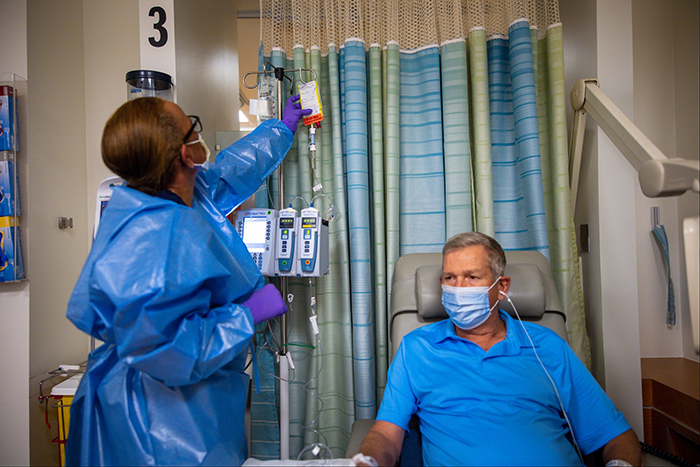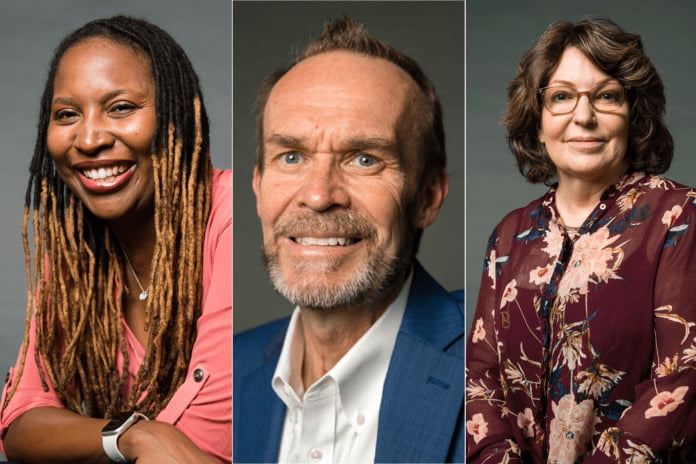Natalie had already visited Winship Cancer Institute of Emory University earlier in her cancer experience when she was considering proton radiation therapy. At Winship, she learned that her tumor was not the typically slow-growing carcinoid, but in fact was growing relatively quickly.
 finding a trial treating the particular protein in Natalie’s cancer was a challenge. But Winship’s Phase 1 research team really helped. Natalie’s husband, Bob, says, “The program coordinator, Nina, spent a lot of time doing the legwork to find studies that potentially would match Natalie’s protein sequence and the other things that have to match in order for you to be accepted into a study. And the study she’s now in, I think there’s 110 people internationally that are in the study. She’s one of only three or four in the United States. That was a lot of legwork on Emory’s part and on Nina’s part to find that study for her.”
finding a trial treating the particular protein in Natalie’s cancer was a challenge. But Winship’s Phase 1 research team really helped. Natalie’s husband, Bob, says, “The program coordinator, Nina, spent a lot of time doing the legwork to find studies that potentially would match Natalie’s protein sequence and the other things that have to match in order for you to be accepted into a study. And the study she’s now in, I think there’s 110 people internationally that are in the study. She’s one of only three or four in the United States. That was a lot of legwork on Emory’s part and on Nina’s part to find that study for her.”
Winship offers patients the opportunity to enroll in a clinical trial. In 2022, Winship enrolled more than 700 people in over 300 interventional and therapeutic clinical trials.
Natalie was happy to have a “Plan B” in the clinical trial. But she had no idea what kind of outcome to expect from the trial, so didn’t get her hopes up too high. Ultimately, she has had an extremely positive outcome.
“Within a few short weeks of the trial, I had some miraculous results,” Natalie says. “In fact, the medical director said he’d never seen anything like it: 70% of the metastasized liver cancer has died off.” She adds, “So we are looking really good to continue on this trial.” Finding the trial for her particular cancer “was really exciting because it is pretty rare,” she says. “And to get the kind of results we got was life-changing, really.”
Natalie’s participation in a clinical trial offers access to an experimental treatment that is proving helpful for her. By participating she is likewise helping future patients who will benefit from her willingness to contribute toward advancing cancer care.
 “Natalie is among the hundreds of patient heroes that come through our Phase 1 space to selflessly fight with us for the same cause,” says Catherine Braga, MSN, AGACNP-BC, the lead advance practice provider in the Phase 1 Clinical Trials Program and Ambulatory Infusion Center at Winship’s Clifton location. “By volunteering their time and participating in these trials, they are changing the face of cancer treatment.”
“Natalie is among the hundreds of patient heroes that come through our Phase 1 space to selflessly fight with us for the same cause,” says Catherine Braga, MSN, AGACNP-BC, the lead advance practice provider in the Phase 1 Clinical Trials Program and Ambulatory Infusion Center at Winship’s Clifton location. “By volunteering their time and participating in these trials, they are changing the face of cancer treatment.”



 finding a trial treating the particular protein in Natalie’s cancer was a challenge. But Winship’s Phase 1 research team really helped. Natalie’s husband, Bob, says, “The program coordinator, Nina, spent a lot of time doing the legwork to find studies that potentially would match Natalie’s protein sequence and the other things that have to match in order for you to be accepted into a study. And the study she’s now in, I think there’s 110 people internationally that are in the study. She’s one of only three or four in the United States. That was a lot of legwork on Emory’s part and on Nina’s part to find that study for her.”
finding a trial treating the particular protein in Natalie’s cancer was a challenge. But Winship’s Phase 1 research team really helped. Natalie’s husband, Bob, says, “The program coordinator, Nina, spent a lot of time doing the legwork to find studies that potentially would match Natalie’s protein sequence and the other things that have to match in order for you to be accepted into a study. And the study she’s now in, I think there’s 110 people internationally that are in the study. She’s one of only three or four in the United States. That was a lot of legwork on Emory’s part and on Nina’s part to find that study for her.” “Natalie is among the hundreds of patient heroes that come through our Phase 1 space to selflessly fight with us for the same cause,” says
“Natalie is among the hundreds of patient heroes that come through our Phase 1 space to selflessly fight with us for the same cause,” says 

